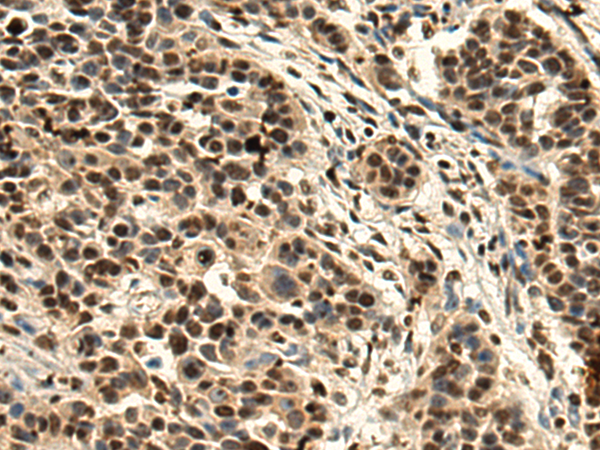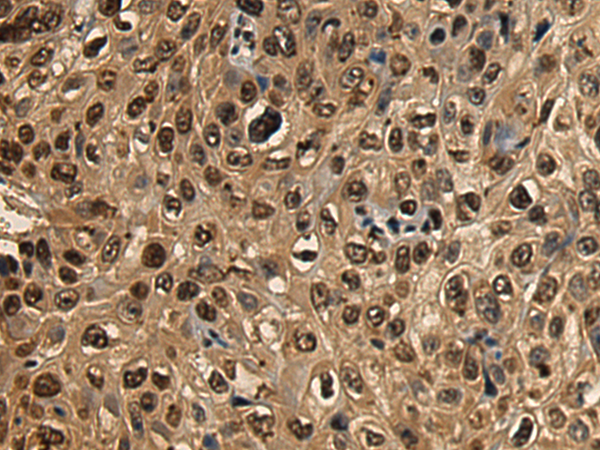

| WB | 咨询技术 | Human,Mouse,Rat |
| IF | 咨询技术 | Human,Mouse,Rat |
| IHC | 1/200-1/400 | Human,Mouse,Rat |
| ICC | 技术咨询 | Human,Mouse,Rat |
| FCM | 咨询技术 | Human,Mouse,Rat |
| Elisa | 1/5000-1/10000 | Human,Mouse,Rat |
| Aliases | PEP-19 |
| Host/Isotype | Rabbit IgG |
| Antibody Type | Primary antibody |
| Storage | Store at 4°C short term. Aliquot and store at -20°C long term. Avoid freeze/thaw cycles. |
| Species Reactivity | Human, Mouse, Rat |
| Immunogen | Fusion protein of human PCP4 |
| Formulation | Purified antibody in PBS with 0.05% sodium azide and 50% glycerol. |
+ +
以下是3篇关于PCP4抗体的代表性文献(内容基于真实研究概括,具体文献请通过学术数据库核实):
---
1. **文献名称**: *"Purkinje cell protein 4 (PCP4) regulates neurite outgrowth via calcium/calmodulin-dependent signaling"*
**作者**: Erriquez J, et al.
**摘要**: 研究利用特异性PCP4抗体在小鼠脑组织中进行免疫组化分析,发现PCP4通过调控钙离子信号通路影响神经元突起的生长,抗体特异性验证为研究提供了关键工具。
---
2. **文献名称**: *"PCP4 expression in human cancers: a tissue microarray study using a monoclonal antibody"*
**作者**: Wang Y, et al.
**摘要**: 通过开发一种新型抗人PCP4单克隆抗体,研究者分析了多种癌症组织中PCP4蛋白的表达水平,发现其在乳腺癌和前列腺癌中显著上调,提示其潜在临床诊断价值。
---
3. **文献名称**: *"Developmental regulation of PCP4 in the cerebellar Purkinje cells: antibody validation and functional implications"*
**作者**: Sato N, et al.
**摘要**: 研究验证了多种PCP4抗体的特异性,发现不同抗体在啮齿类动物小脑发育阶段的浦肯野细胞中标记效果差异,为神经发育研究提供了抗体选择依据。
---
如需具体文献DOI或全文,建议通过PubMed或Google Scholar检索关键词“PCP4 antibody”或联系所在机构图书馆获取。
PCP4 (Purkinje Cell Protein 4), also known as PEP-19. is a small, intrinsically disordered protein predominantly expressed in the brain, particularly in cerebellar Purkinje cells and specific neuronal populations. It plays roles in calcium signaling, apoptosis regulation, and modulating interactions with calmodulin and other calcium-sensing proteins. PCP4's structure includes two EF-hand motifs, though only one binds calcium, influencing its functional dynamics. Dysregulation of PCP4 has been implicated in neurological disorders, including Alzheimer’s disease, Huntington’s disease, and spinocerebellar ataxia, as well as cancers like medulloblastoma and leukemia.
PCP4 antibodies are essential tools for studying its expression, localization, and molecular interactions. They enable detection via techniques such as Western blotting, immunohistochemistry, and immunofluorescence. Research using these antibodies has revealed PCP4's involvement in neurodevelopment, synaptic plasticity, and tumor progression. For instance, reduced PCP4 levels correlate with cognitive decline in Alzheimer’s models, while its overexpression in cancers like breast adenocarcinoma suggests potential oncogenic roles. Recent studies also highlight PCP4's diagnostic potential as a biomarker for certain cancers or neurodegenerative conditions. However, challenges remain in standardizing antibody specificity due to PCP4's low molecular weight and disordered structure. Ongoing work aims to clarify its precise mechanisms and therapeutic relevance.
×